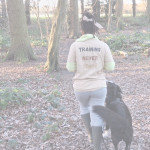Meeting Your Dog Where They Are
Every dog is different — and every owner has a vision of what they want life with their dog to look like.
Some want calm, neutral walks. Some want to pass other dogs without stress. Others want reliability, focus, or simply to enjoy being outside together without feeling overwhelmed.
Our training walks are built around bridging the gap between what your dog needs right now and what you want your dog to be able to do in the real world.
We work from the dog towards the goal
Rather than forcing dogs into situations they’re not ready for, we look at what will genuinely help them progress.
That means asking:
-
What does this dog need in order to feel regulated?
-
What skills are missing?
-
What is the environment asking of them?
-
And how do we move them, safely and fairly, towards the owner’s goals?
Progress comes from clarity, not pressure.
Our staples on training walks
There are a few core elements you’ll see consistently on DroopyChaos training walks:
Engagement & fulfilment
Helping the dog stay connected to their handler and feel satisfied — mentally and emotionally — not just physically tired.
Neutrality & controlled exposure
We work on being able to observe the environment without reacting. This isn’t flooding or forced socialisation — it’s supported exposure at the dog’s pace.
Foundational handling skills
Including loose lead walking, clear communication, and respecting thresholds so dogs aren’t repeatedly pushed past what they can cope with.
These foundations create safety. From there, we build.
Every walk is tailored — because needs aren’t one-size-fits-all
Some dogs need:
-
More mobility and structured exercise
-
Confidence building and environmental exploration
-
Impulse control and frustration tolerance
-
Fulfilment through problem-solving and engagement
-
Space, distance, and slower pacing
Others need a careful balance of all of the above.
That’s why no two training walks look exactly the same.
We adjust distance, duration, intensity, and focus based on what will best support your dog — while always keeping the long-term goal in mind.
Training with intention
Training walks aren’t about clocking miles or “getting it done”. They’re about intentional practice.
Every decision — when to stop, when to move, when to engage, when to give space — is made to support emotional regulation, learning, and confidence.
Over time, these small, well-chosen moments add up to big change.
The goal: a calmer, more enjoyable life together
Ultimately, our aim is simple:
To help dogs feel safe enough to make better choices — and to help owners build the skills and understanding needed to live in harmony with their dogs.
We don’t rush dogs to fit a picture. We build dogs who can cope with the world they live in.
Training never stops



